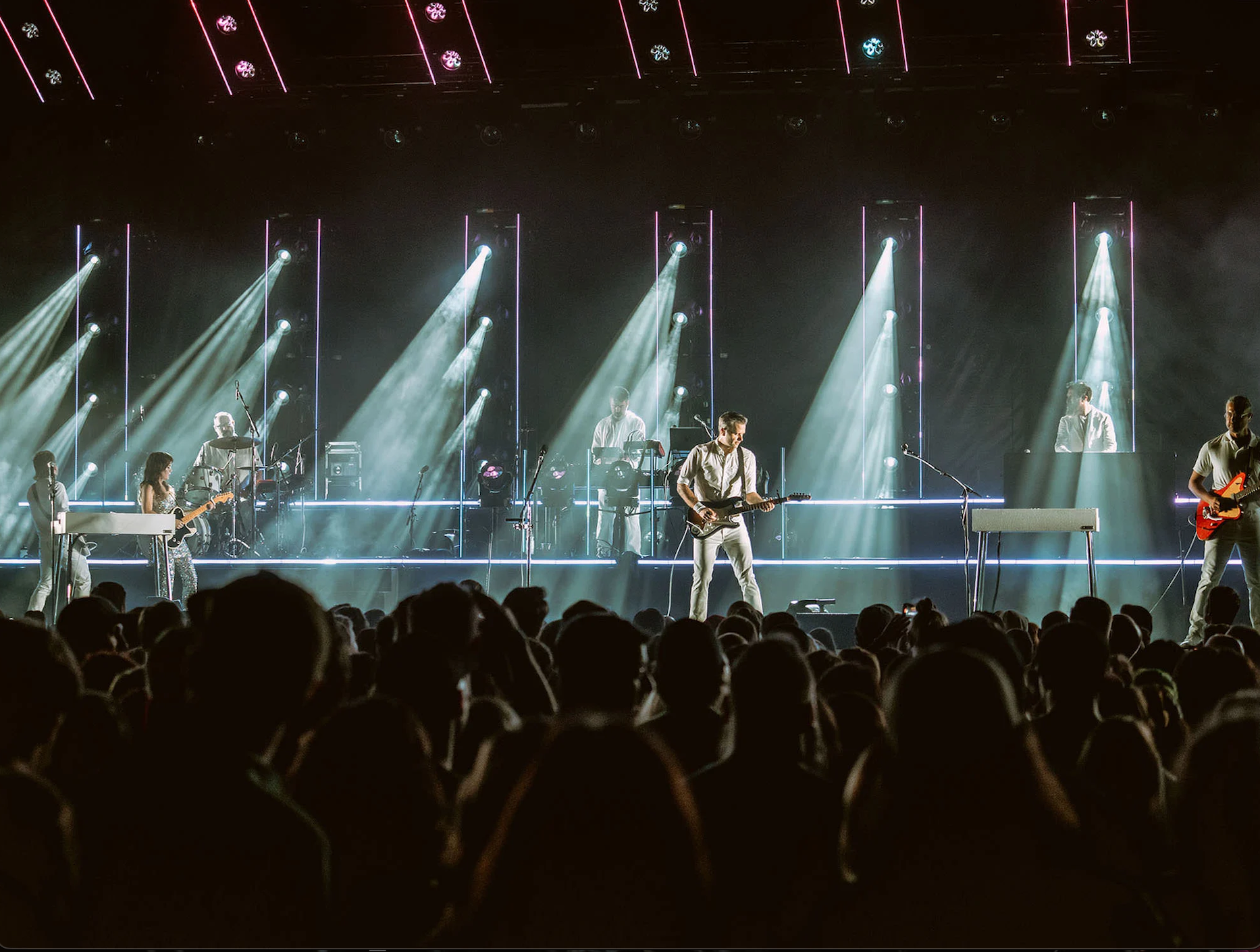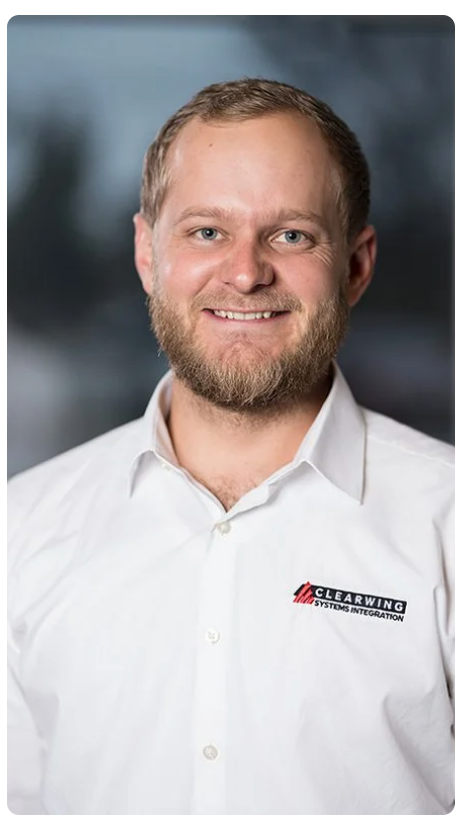Most concerts are a 2 hour experience for people. You turn up, rock out, take photos – and if it were particularly good, maybe even remember it for the rest of your life.
For the Bruncliks, who own a family-run live event production and commercial a/v systems integration business, that concert was the culmination of hundreds of hours of work. Behind the curtain, and weeks before the curtain, the team at Clearwing are working thoroughly with the client to plan the show that you’re about to see. This means getting to know all their specifications for lighting, audio gear, and all other production logistics, and then paying attention to every detail to ensure the delivery exceeds expectations on the big day.

This boutique company does this entire process for all the sound and lighting at Summerfest, as well as other festivals and special events around the country. They also tour and/or provide live production services to bands like Steve Miller Band and Odeza.
Although Clearwing has expanded from Milwaukee to other locations in Arizona and Colorado, their roots are here, and they love being part of such an amazing community.

We’re lucky to call Max Brunclik, son of Clearwing co-founder and CEO Gregg Brunclik, a friend and former Team Trimble client. Max is currently the Vice President of Clearwing’s Systems Integration division and a resident of Lake Country.
He talked with us about what it’s like to work with family, and what live event production and systems integration really means.
Q: What gave your dad the idea to start this production business in the 70s?
A: In high school, my dad, Gregg Brunclik, played keyboard in a band with his buddies. He started experimenting with running the sound, which turned into building audio cabinets for the band and producing shows at local clubs. After he got a big break producing for country artist Eddie Rabbitt he knew he’d officially moved from guy on the stage to guy behind the scenes. Clearwing was built by Gregg and we are proud to carry the torch.
Q: What makes Clearwing different from other production & systems integration companies?
A: Our competitive advantage is our people and our process. Not everybody puts in all the front-end work that we do ahead of a show. You could get the audio gear anywhere to run a show, but the people doing it make the difference. That’s not to say gear doesn’t matter. As technology is ever-changing, we keep up to take on new equipment. But it’s our people and approach that we’re really proud of.
Q: What does a typical preparation look like for a show?
A: For weeks ahead of the show we collaborate with the client to understand their vision. This means getting all of their show files – which is how they want the lighting, what gear they want, who does what, where the venue is – all the logistical things that take a long time to plan. And every client has really specific things they’re looking for and expectations. That’s where we shine – our attention to detail. We are really well known for our prep prior to the show. When we show up, everything is ready to fly. A lot of people dont put that much time and effort into the front end.
On the day of the show, we load all the equipment and conduct all the sound and lighting checks. The talent usually rolls in midday for their sound check, but by then they expect everything to be perfect and waiting for them to go. During the show we are monitoring the system and solving problems that might come up. Afterward, we pull it all down and begin packing up again. If we’re doing this on tour, this means we’re typically working from 6 am that morning until 1 or 2 am the next day. They’re long days.
Q: What’s a stand-out show your team has produced?
A few years back we did the David Gilmour tour – the lead singer for Pink Floyd. That was really cool to be a part of just because of how legendary he is.
Q: What’s the biggest production feat you’ve had?
So we don’t just do concerts, we do sporting, corporate, performing arts and campaign events as well. When the Cubs won the series in 2016, we were on standby to do a massive coming home celebration for them. We didn’t get word until about 7 hours before the celebration, and then had to pack about 8 semitrucks worth of gear and be ready in Chicago that day. There were 5 million people there that day. I can’t believe we pulled that off.
Q: Do you get to enjoy the concerts as well?
Personally I was just in Nashville to just watch Odesza because I’m such a huge fan. We also provide their audio gear for their tour. So you also get those shows where you personally love the music and being a part of it is as personally fulfilling as it is professionally.
Q: What’s it like to work with family?
Working with your family is interesting. You’re almost stuck in limbo – you’re never quite at work and never quite at home. Work is home and home is work. I love it and working with my older brother, Bryan, who is our VP of Production. We talk shop all the time as a family, but it’s a fine line. We all know what gets on each other’s nerves. It’s a challenge but it’s fulfilling to work with family and for your family.
Q: How has your role changed in the company?
Most people think about the production side of the business that we’ve just talked about already, – the shows and technology. But I recently moved to the systems integration side, which is basically this but for permanent installation. For example, putting a new audio system in a church. Most people don’t think about how important this is, but the audio is used every weekend and you take for granted how impactful it is to hear the priest and organ clearly. This side of the business is hugely important. Where production takes months of planning, this takes years. It’s attention to detail and design on a whole different level, so it’s been cool to learn this side of things as well.
Q: What’s the hardest part about working for a family-run business?
We’re only as deep as our own pockets. While we don’t struggle, we have to be a lot more disciplined with our investments. We could spend money all over the place to level up gear, get into different types of businesses, buy buildings, all kinds of things that we want to do. But because we don’t have the financial resources like some private equity backed companies, we rely on our people to make the difference. We invest in them and it’s our biggest return.
Q: What are you most proud of with the company’s success?
We are most proud of the number of people we support in our communities. We have around 130-160 full-time employees, plus their families, who are being supported by the success of the company’s collective efforts. It’s a big responsibility.
Q: What do you love the most about being local to metro-Milwaukee?
We’ve been in the Milwaukee community since 1976. We don’t run around making noise, so not a lot of people maybe know our name, but we’ve been here for a long time. We love the city and love to be a part of its thriving music community. It’s a great place to call home.


